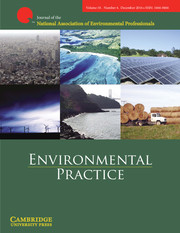No CrossRef data available.
Article contents
The Green State: Rethinking Democracy and Sovereignty
Published online by Cambridge University Press: 16 August 2006
Extract
The Green State: Rethinking Democracy and Sovereignty. Robyn Eckersley. 2004. The MIT Press, Cambridge, MA. 347 pp. $25 paperback.
Green political theorists often express deeply antagonistic attitudes toward the modern nation-state. The nation-state is denounced by many such thinkers for contributing to ecological destruction through the encouragement of unsustainable economic growth and the facilitation of natural resource extraction, among other practices. Another frequent criticism is that the finite territorial sovereignty of nation-states renders them inadequate to deal with environmental problems that are inherently transnational in scope. While recognizing the legitimacy of such critiques, Robyn Eckersley comes to the defense of the beleaguered nation-state in her provocative new work, The Green State: Rethinking Democracy and Sovereignty. Throughout its pages, Eckersley argues that because the nation-state is still the primary locus of social and political power in the world, the most realistic and effective strategy for addressing environmental problems is to work toward transforming individual states into greener institutions, rather than seeking elusive supranational solutions.
- Type
- FEATURES & REVIEWS
- Information
- Copyright
- © 2006 National Association of Environmental Professionals


